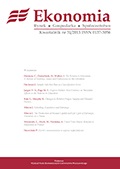Koncepcje dobrobytu i porównania interpersonalne
Theories of well-being and interpersonal comparability
Author(s): Tomasz KwarcińskiSubject(s): Social Sciences, Economy, Sociology, Family and social welfare, Economic development, Socio-Economic Research
Published by: Uniwersytet Warszawski - Wydział Nauk Ekonomicznych
Keywords: well-being; interpersonal utility comparison; rationality;
Summary/Abstract: The interpersonal utility comparisons (IUC) appear to be intuitively possible and practically requisite to carry out public policy and theoretically indispensable if we want to avoid difficulties regarding Arrow’s impossibility theorem. Although economists are usually skeptical of the possibility and meaningfulness of such comparisons, because of above mentioned practical and theoretical requirements they tried to build a “bridge” between subjective utility or well-being of different people. This “bridge” constitutes personal preferences the fulfillments of which determine the level of subjective well-being. There is another, less exposed, objective approach to overcoming the IUC problem. It is an effort to justify some external comparability criterion to the personal mental states. The aim of my paper is an attempt to argue for an objective account of well-being. There are following steps of the argumentation: (1) the analysis of the reasons why economists tend to choose preference-based theory of well-being, (2) the indication of the weaknesses of this approach to well-being, (3) the discussion of some doubts regarding objective list theory of well-being, (4) the suggestion of the hybrid version of well-being which contains the objective standards useful to carry out interpersonal comparison. All of these steps will be complemented by some remarks devoted to the issue of categorization of the well-being theories.
Journal: Ekonomia. Rynek, Gospodarka, Społeczeństwo
- Issue Year: 2016
- Issue No: 45
- Page Range: 105-133
- Page Count: 29
- Language: Polish

